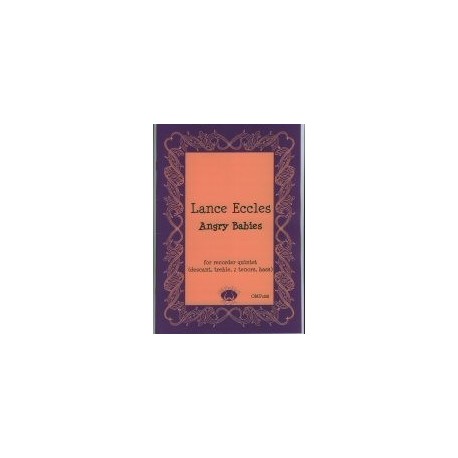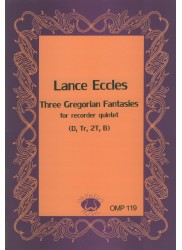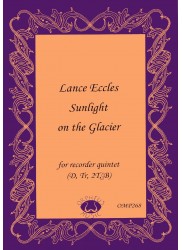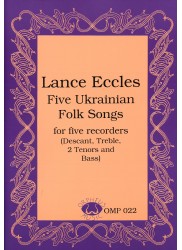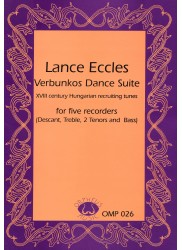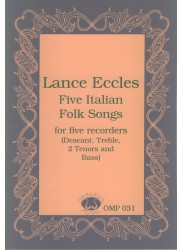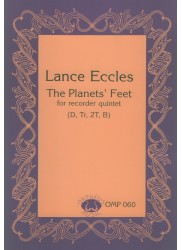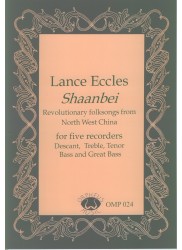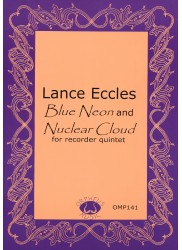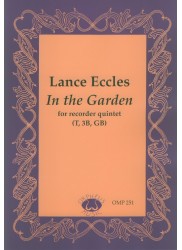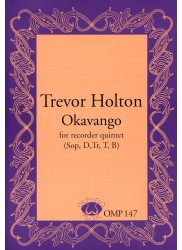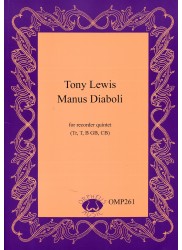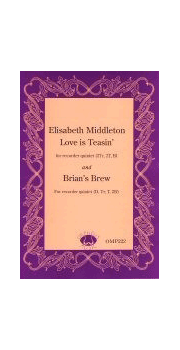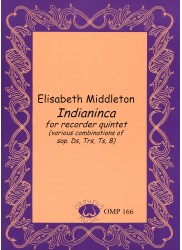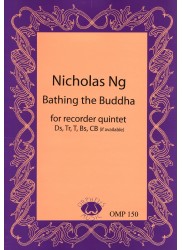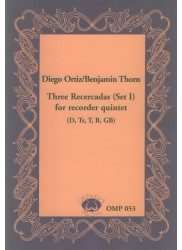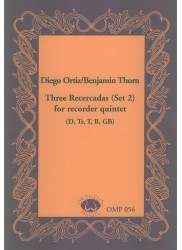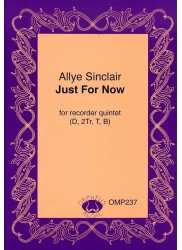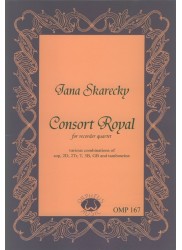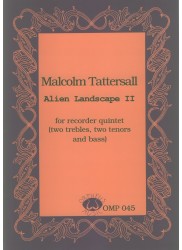No products
Prices are tax included
Angry Babies
Composer: Eccles - Lance
Instrumentation: Descant - Treble - 2 Tenors - Bass
Period/genre: Australian Contemporary
Grade: Moderate
More info
*Contemporary Piece.* Three nicely dissonant character pieces.
1. Babies in Uproar
2. Babies Asleep
3. Disobedient Babies
_Score 9 pp. Part 3 pp._
REVIEWS OF TEN COMPOSITIONS BY LANCE ECCLES
(Orpheus Music, orpheusmusic.com.au).
For 20 years, Lance Eccles was a member of the Reluctant Consort, a group based in Sydney, Australia. Most of his compositions have been written for this consort or for meetings of the Sydney Society of Recorder Players. Eccles is retired from his position as a senior lecturer in Chinese at Macquarie University. His current web site states that he is an "honorary senior research fellow in the Department of Ancient History at Macquaie University in Sydney, Australia"; see www.ocs.mq.edu.au/~leccles.
There are generalities that apply to many of the pieces reviewed here. The reader will note that all of the pieces have colorful programmatic titles. Sometimes, the music des indeed match the literary ideas of the titles. In this reviewer's opinion, there are other cases (as specifically noted below) where the literary images of the title and the actual music do not seem to connect. It may be, in some cases, that some words in these titles simply have other connotations in Australian culture. In any case, a simple solution for this problem would be for the publications to include information regarding the literary ideas behind the titles and how these ideas connect to the music.
Concerning his style, rhythms are straightforward and on the easier side, oftentimes using light syncopation. For the most part, the voices are very active, with a common exception being the bass lines. It is rare for the upper voices to hold any note longer than a halfnote, sometimes even in the final measures. Eccles has a remarkable ability to have voices moving every half beat for extended passages. He does a great job keeping his voices in lively contrary motion, but he also uses parallel motion to great effect. He likes abrupt endings.
Some of his music uses lush Romantic harmonies; some is more contemporary and mildly dissonant or even sharply dissonant. Eccles is equally at home in all these harmonic idioms. To enjoy hearing and playing Eccles's music, you will need a taste for contemporary harmony. Having said that the rhythms are easy, I should also mention that most of his music is quite chromatic. If your groups are interested in playing these pieces, get out the chromatic scales; you will need to know all chromatic fingerings.
Eccles likes to use phrase modulations to distantly-related keys. There are no avantgarde techniques in any of these pieces, beyond simple flutter-tonguing. If I had to rate them for difficulty on a scale of one to five, most would rate a three with exceptions noted below.
Regarding prices listed, Orpheus Music will remove taxes from the total for non- Australian customers. Prices vary day to day. These pieces are listed with two purchase options: the published version (in hard copy with the well-known purple and orange covers) and the .pdf instantly-downloadable version from orpheusmusic.com.au.
OMP188 Lance Eccles ANGRY BABIES.
The quintet Angry Babies is a threepiece suite beginning with "Babies in Uproar." As one would expect with this title, there are sharp dissonances.
After the bass's four-measure introduction, the piece immediately jumps to a fast off-beat, calypso rhythm that is fun to play - it doesn't sound "angry" to me, but does end abruptly, like a pacifier being placed firmly in each baby's mouth. It's safe to say that most babies are not quite as rhythmic in their anger!
"Babies Asleep" is a slower-moving andante. However, within this, there is still a constant stream of voices moving on every half-beat.
The third piece, "Disobedient Babies," is again fun to play, especially for the soprano - with plenty of action leftover for the other parts. It illustrates another instance of abrupt phrase modulation - in this case, G minor to B minor, including a section in C minor. It ends with the same type of inner-voice cross relation as the second movement.
Susan Groskreutz, American Recorder, January 2011.
Lance Eccles
Angry Babies
SATTB recorders
Orpheus Music, OMP 188
Angry Babies is described in the Orpheus catalogue as 'three nicely dissonant character pieces, which, I suppose is just how angry babies are; 'dissonant'! The three movements are written in Lance Eccles's rhythmic and chromatic style, the first being 'Babies in Uproar. This has a slow introduction with movement mainly in the bass line, before breaking out into fast movement with a calypso-type rhythm in the inner parts and bars of repeated notes. (Are these babies drumming their heels?) The piece gathers
momentum before ending abruptly. By contrast, 'Babies Asleep' conveys some calmer moments, although there are still plenty of accidentals to contend with. It is a fairly short movement, so one supposes that the babies don't stay asleep for long. 'Disobedient Babies' is the final movement. Here
there are quite a few rhythmic challenges whilst the music travels through a series of modulations, with more musical stamping of feet and some musical shouting before the music rushes to a close.
There are plenty of challenges for the players in 'Angry Babies', plenty
to work on to get the pieces right and a sense of satisfaction when you do
Janice Ormerod, Recorder Mail Summer 2009 p.73.
30 other products in the same category:
Reference: OMP119.pdf
Brand: Orpheus Music
Three Gregorian Fantasies
PLEASE NOTE - DOWNLOADABLE PDF VERSION Composer: Eccles - Lance...
$31.00 -20%In StockReference: OMP188.pdf
Brand: Orpheus Music
Angry Babies
PLEASE NOTE - DOWNLOADABLE PDF VERSION Composer: Eccles - Lance...
$25.00 -20%In StockReference: OMP268
Brand: Orpheus Music
Sunlight on the Glacier
Composer: Eccles - Lance Instrumentation: Descant - Treble - 2 Tenors - Bass...
In StockReference: OMP268.pdf
Brand: Orpheus Music
Sunlight on the Glacier
PLEASE NOTE - DOWNLOADABLE PDF VERSION Composer: Eccles - Lance...
$22.00 -20%In StockReference: OMP022.pdf
Brand: Orpheus Music
Five Ukranian Folk Songs
PLEASE NOTE - DOWNLOADABLE PDF VERSION Composer: Eccles - Lance...
$23.50 -20%In StockReference: OMP026.pdf
Brand: Orpheus Music
Verbunkos Dance Suite
PLEASE NOTE - DOWNLOADABLE PDF VERSION Composer: Eccles - Lance...
$23.50 -20%In StockReference: OMP031.pdf
Brand: Orpheus Music
Five Italian Folk Songs
*PLEASE NOTE > DOWNLOADABLE-ONLY PDF VERSION Composer: Eccles - Lance...
$23.50 -20%In StockReference: OMP060
Brand: Orpheus Music
The Planet's Feet
Composer: Eccles - Lance Instrumentation: Descant - Treble - 2 Tenors - Bass...
In StockReference: OMP024
Brand: Orpheus Music
Shaanbei Four Folk Songs North-West China
Composer: Eccles - Lance Instrumentation: Descant - Treble - Tenor - Bass -...
In StockReference: OMP024.pdf
Brand: Orpheus Music
Shaanbei Four Folk Songs North-West China
PLEASE NOTE - DOWNLOADABLE PDF VERSION Composer: Eccles - Lance...
$23.50 -20%In StockReference: OMP141.pdf
Brand: Orpheus Music
Blue Neon and Nuclear Cloud
PLEASE NOTE - DOWNLOADABLE PDF VERSION Composer: Eccles - Lance...
$19.00 -20%In StockReference: OMP141
Brand: Orpheus Music
Blue Neon and Nuclear Cloud
Composer: Eccles - Lance Instrumentation: Descant - 2 Trebles - Tenor - Bass...
In StockReference: OMP251
Brand: Orpheus Music
In the Garden
Composer: Eccles - Lance Instrumentation: Tenor - 3 Basses - Greatbass...
In StockReference: OMP251.pdf
Brand: Orpheus Music
In the Garden
PLEASE NOTE - DOWNLOADABLE PDF VERSION Composer: Eccles - Lance...
$19.00 -20%In StockReference: OMP147.pdf
Brand: Orpheus Music
Okavango
PLEASE NOTE - DOWNLOADABLE PDF VERSION Composer: Holton - Trevor...
$22.00 -20%In StockReference: OMP147
Brand: Orpheus Music
Okavango
Composer: Holton - Trevor Instrumentation: Sopranino - Descant - Treble -...
In StockReference: OMP261
Brand: Orpheus Music
Manus Diaboli
Composer: Lewis - Tony Instrumentation: Treble - Tenor - Bass - Greatbass -...
In StockReference: OMP222
Brand: Orpheus Music
Love is Teasin' & Brian's Brew
Composer: Middleton - Elisabeth Instrumentation: Descant - Treble - Tenor -...
In StockReference: OMP222.pdf
Brand: Orpheus Music
Love is Teasin' & Brian's Brew
PLEASE NOTE - DOWNLOADABLE PDF VERSION Composer: Middleton - Elisabeth...
$19.00 -20%In StockReference: OMP166
Brand: Orpheus Music
Indianinca
Composer: Middleton - Elisabeth Instrumentation: Sopranino - Descant -...
In StockReference: OMP166.pdf
Brand: Orpheus Music
Indianinca
PLEASE NOTE - DOWNLOADABLE PDF VERSION Composer: Middleton - Elisabeth...
$19.00 -20%In StockReference: OMP150
Brand: Orpheus Music
Bathing the Buddha
Composer: Ng - NicholasInstrumentation: Tenor - Bass + optional...
In StockReference: OMP053
Brand: Orpheus Music
Three Recercadas Set 1
Composer: Ortiz - Diego Arranger: Benjamin Thorn Instrumentation: Descant -...
In StockReference: OMP053.pdf
Brand: Orpheus Music
Three Recercadas Set 1
PLEASE NOTE - DOWNLOADABLE PDF VERSION Composer: Ortiz - Diego Arranger:...
$25.00 -20%In StockReference: OMP056*
Brand: Orpheus Music
Three Recercadas Set 2
Composer: Ortiz - Diego Arranger: Benjamin Thorn Instrumentation: Descant -...
In StockReference: OMP056.pdf
Brand: Orpheus Music
Three Recercadas Set 2
*PLEASE NOTE > DOWNLOADABLE-ONLY PDF VERSION Composer: Ortiz - Diego...
$22.00 -20%In StockReference: OMP237
Brand: Orpheus Music
Just For Now
Composer: Sinclair - Allye Instrumentation: Descant - 2 Trebles - Tenor -...
In StockReference: OMP237.pdf
Brand: Orpheus Music
Just For Now
PLEASE NOTE - DOWNLOADABLE PDF VERSION Composer: Sinclair - Allye...
$22.00 -20%In StockReference: OMP167.pdf
Brand: Orpheus Music
Consort Royal
PLEASE NOTE - DOWNLOADABLE PDF VERSION Composer: Skarecky -...
$31.00 -20%In StockReference: OMP045
Brand: Orpheus Music
Alien Landscape II
Composer: Tattersall - Malcolm Instrumentation: 2 Trebles - 2 Tenors - Bass...
In Stock

